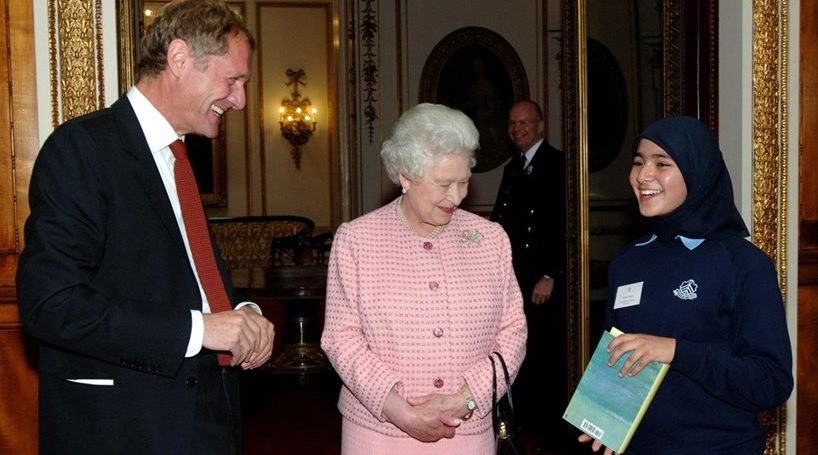Heaven found in ordinary
News
The Rev’d Dr Mark Oakley traces the significance of faith in the work of the Queen’s Poets Laureate: “Poets Laureate help us to see what Philip Larkin called ‘the million-petalled flower Of being here’. Thank God for that”

Despite a past reputation as an erudite pursuit for a small clique of specialists, poetry has enjoyed a renaissance in public life in recent decades. The belief (often attached to memories of unfulfilling poetry study at school) that it is somehow too difficult for the average person to appreciate has been overtaken by the view that poetry is not only readily accessible, but essential for the exploration and expression of human experience.
This latter view is not new, and underpins the part played by the Poet Laureate. Ever since John Dryden was appointed to the post by King Charles II in 1668, there has been an unbroken succession of poets whose work has been thought significant for our national life. Seven of them have served their term during the 70 years of our own Queen’s reign.
With no job description, an honorarium of about £6000 p.a., and the gift of 720 bottles of sherry from producers in Spain (now a goodwill gesture to celebrate the cultural and trading links between that country and Britain), it is an unusual appointment, and – although it used to be for life – is now limited to ten years.
Those who appreciate poetry often do so for its capacity to prompt recognitions within the self, as well as fine-tuning an attentiveness to the world, to language, and – in lyric poetry, especially – to the ambiguities of the “I” that we use.
The work of the Laureates has further been deployed to help make sense of, or bring some perspective to, national events, whether happy or tragic. Religious faith is not a job requirement, and it might be argued that poetry is now a vehicle for a resonance formerly channelled by religion. Certainly, the Poet Laureates of the past 70 years have been very much formed by a world – identified by David Jones – in which the language of Christian belief has become faint, fractured, or forgotten.
Advertisement
In 1953, the serving Poet Laureate was John Masefield. Appointed by George V, he was the longest-serving Laureate apart from Tennyson, in post for 37 years. Although not thought of as a “religious” poet (and better remembered for his lines from “Sea-Fever”: “I must go down to the seas again, to the lonely sea and the sky, And all I ask is a tall ship and a star to steer her by”), he did write religious drama. In 1911, he had written a poem about a man’s conversion to Christ, “The Everlasting Mercy”. Five years later, his play Good Friday opened in London in the middle of the First World War.
Later, Bishop George Bell commissioned him to write a nativity play, The Coming of Christ, to be performed on the steps of Canterbury Cathedral in 1928. It is similar in style to a Mystery Play, and, with its observation of “The world of men seizing and slaying, Lusting for wealth, destroying and betraying, With neither hope nor peace”, might be ready for a contemporary staging.
Masefield was a modest man. When sending his Laureate poems to The Times for publication, he included a stamped addressed envelope for their return in case they were not deemed good enough. A verse of his was discovered after his death:
Advertisement
Let no religious rite be done or read
In any place for me when I am dead,
But burn my body into ash, and scatter
The ash in secret into running water,
Or on the windy down, and let none see;
And then thank God that there’s an end of me.
This, though, might be placed alongside words he wrote for the nativity play. With echoes of the apophatic tradition, we sense a trust that reaches beyond the pained confusions of life:
By mercy and by martyrdom,
And many ways, God leads us home;
And many darknesses there are,
By darkness and the light he leads,
He gives according to our needs,
And in his darkness is a star.
Cecil Day Lewis followed Masefield as Laureate, but only for four years before his death in 1972. The son of an Irish clergyman, with whom he had had a strained relationship, Day Lewis will probably be remembered more for his earlier work when he was part of the “Auden generation”.
He was someone who could never forget the “fanaticism and dogmatism, intolerance and cruelty, intellectual dishonesty, the folly, crankiness, or opportunism” of religious faith and its adherents. He believed, however, that “faith is the thing at the core of you, the sediment that’s left when hopes and illusions are drained away. The thing for which you make any sacrifice because without it you would be nothing – mere walking shadow.”
He said that he wished he had a belief himself, but that “any creed of mine would be honeycombed with confusions and reservations. Yet when I write a poem I am trying to make sense out of life. And just now and then my experience composes and transmutes itself into a poem which tells me something I didn’t know I knew.”
His poem “Walking Away”, in which he watches his child play his first game of football, and then, at the end of the match, go off with his mates rather than running to his father, ends with a poignant reflection:
…Perhaps it is roughly
Saying what God alone could perfectly show –
How selfhood begins with a walking away,
And love is proved in the letting go.
Two very different Laureates picked up the baton after Day Lewis: John Betjeman (1972-84) and Ted Hughes (1984-98), both of whom remain well known today. Whereas Hughes is often considered antagonistic to Christian faith – aided presumably by his childhood memories, when chapel made Sunday a “day of psychological torment” – some believe him to have maintained strong affinities with Christian symbolism, and relish his creative working on themes such as the Fall, incarnation, and crucifixion.
In 1982, the chief of staff at Lambeth Palace invited Hughes to take part in a discussion between church representatives and poets to explore common interests. Hughes refused, on the grounds that any formal relations with the Church would compromise his poetic gift. In a 1990 letter to a friend and Anglican priest, Moelwyn Merchant, however, he refers to “the divine world” from which the evolution of our human brains and the acquisition of “ego-consciousness” have separated us.
Hughes’s inconsistent use of quotation marks for words such as “divine” and “sacred” reflect an unease at aligning himself too closely with their orthodox religious meaning; but the letter makes it clear that he takes seriously the idea of the sacred. As David Troupes has argued, for Hughes, “God” may best be considered “in relational, un-dogmatic terms as that to which we seek reconnection, where that seeking, that need, is taken as a given of the human condition.”
Betjeman is recalled as a much more positive friend to the Christian faith, albeit someone happily living in the suburbs of the City of God, not quite up to dealing with all the noisy traffic in the centre. The forms of his poems are often reminiscent of Victorian hymnody, and about 75 of them are unapologetically religious in focus.
Unafraid of irony, or of exposing the snobbery and ambition of Church of England clerics and congregations (“So, Lord, reserve for me a crown, And do not let my shares go down”), he remained a communicant member of this Church, even though faith was not always an easy commitment for him.
Auberon Waugh thought that Betjeman affected “a cosy certainty in religion which he was never within miles of feeling”. Betjeman’s own words in The Spectator might get us nearer to the truth: “The only practical way to face the dreaded lonely journey into Eternity seems to me the Christian one. I therefore try to believe that Christ was God made Man and gives Eternal Life, and that I may be confirmed in this belief by clinging to the sacraments and by prayer.” Or, as he puts it in his poem “Christmas”, still regularly heard at carol services:
No love that in a family dwells,
No carolling in frosty air,
Nor all the steeple-shaking bells
Can with this single Truth compare –
That God was man in Palestine
And lives today in Bread and Wine.
Andrew Motion (1999-2009) engages in much of his poetry with the possibilities of belief. Never having woken up one day and thought “I don’t believe in God”, he says, instead, his faith just gradually melted like snow.
There is, however, a palpable sense of the numinous in his work, often around immersions in landscape and love. He has said: “My own faith…is something which comes and goes rather; so I suppose that fits into the general shape of the poem. When I am able to feel it – and it’s something that I would very much like to feel more regularly, more fluently – I do sometimes feel bewildered by the richness of the promises it appears to make and keep.”
His poem “Simple”, about John’s account of the resurrected Christ on the shore, ends:
The fire burned on the beach
with their unusual catch.
They had expected nothing.
Now there was too much.
Carol Ann Duffy (2009-19) was raised in a Roman Catholic home, but became an atheist at the age of 15, although she has often spoken of how her religious upbringing has influenced her work: “Poetry and prayer are very similar.”
In her poem “Prayer”, she writes “although we cannot pray” and “although we are faithless”, but then explores how the ordinary, insignificant occurrences of life can bring some consolation, language itself instilling a sense of homecoming.
This secular sacramentalism, in which reality is both worthy of trust and a place of potential epiphany, feels related to a faith perspective, and opens up a generous space for a conversation between poetry and belief.
The present Laureate is Simon Armitage. In a similar vein to Duffy, he has said: “Poetry is often about detail, even to the point where there’s just something sacramental in the ordinary descriptions of everyday life.” The heightened chattiness of his poetic tone, and the warmth of his Huddersfield accent when reading his work, can be deceptive.
“There is something about poetry that is oppositional,” he has written, “it is a form of dissent. Even in its physical form it doesn’t reach the right-hand margin or the bottom of the page. There’s something a little bit obstinate about it. It’s the literary equivalent of the awkward squad.”
Armitage is not a believer in God, and has said that he thinks life is “meaningless”: “I don’t think there’s a programme, I don’t think there’s a plan, and I think poetry is not so much about discovering significance as about inventing it, about inventing meaning. And that makes us feel better. You know, patterns, coincidence, significance, ideas we can share.”
Shelley believed that “poets are the unacknowledged legislators of the world.” Perhaps, today, they are more the legislators of the unacknowledged world, in that they teach us the art of attention in lives that are increasingly distracted. Where that art is refined, the rumour of God is never far away.
Poets Laureate help us to see what Philip Larkin called “the million-petalled flower Of being here”. Thank God for that.
The Revd Dr Mark Oakley is the Dean of St John’s College, Cambridge, and author of The Splash of Words: Believing in poetry (Canterbury Press; 2016).
First published in Church Times on 27 May 2022. Visit the Church Times website to subscribe today.





